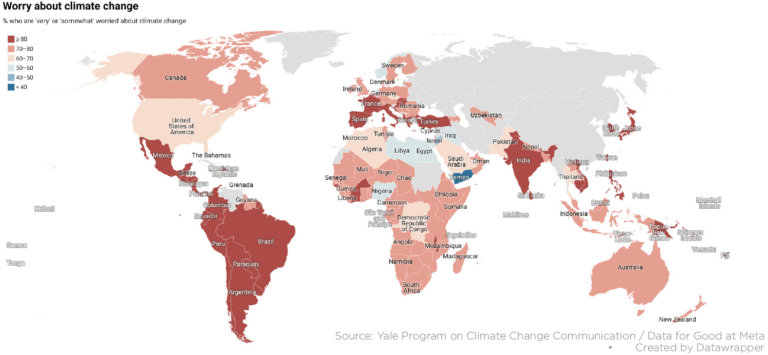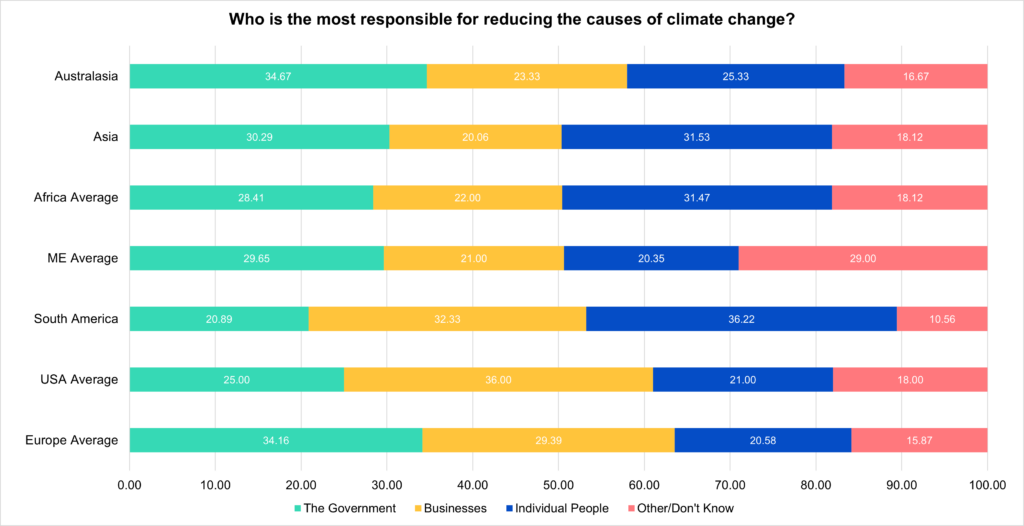Outlook Snapshot
- Climate discourse has become increasingly personal, focusing on the responsibilities of the individual and not the collective responsibility of governments and corporates.
- We expect this attitude to shift, and utilise survey data to show that to the global populace, climate change remains a key issue despite the shifting political narrative.
- We invest across climate themes amongst others, including solar power production and clean water. As the debate shifts towards collective responsibility, we would expect investment from governments and corporates in these themes to increase further.
Environmental Investing: Understanding public opinion and implications for investing
There are few topics in investment that illicit more emotive responses amongst investors than environmental investing. Debate with someone about factor investment styles, valuation metrics or the path of the US Rates curve and the debate that follows will likely be polite and objective (or some may well glaze over). Start a debate about climate change in finance – or really in any walk of life, and often the responses are impassioned. Arguments are full of ad-hominems, individual examples and ‘gotcha’ moments. Complex debates about carbon output, grid technology and intermittency are reduced to discussions about the merits or demerits of avocados on the environment. This comes from both sides of the aisle, and over the course of 2022 we would argue has gotten worse – the ongoing politicisation of climate issues only serves to further divide and worsen discussion.
The cause of this, to a degree is the focus on individualism when it comes to thinking about carbon emissions and climate change, which has been a masterstroke of big industry lobbying, and a true blessing to polluting heavy industry. In the 1970s for example, facing pressure from politicians to ban or tax plastics, a lobbying effort deflected, instead suggesting plastics should and could be recycled. The reality was far from the truth, at the time no technology existed to recycle plastics, and even today only 9% of plastic is recycled.
Fast forward to the climate crisis, and in 1992 BP coined the term carbon footprint (borrowing from earlier work on the ecological footprint). The footprint, implying that it is up to the individual to determine whether they lead a ‘good’ or ‘bad’ carbon life. It doesn’t matter then, that the biggest carbon choices they can make (how their electricity is produced, how the goods and food they purchase is produced, how far from work they can afford to live) is out of their hands. The concept of the carbon footprint further misses network effects (ie when we do something our friends or colleagues may do it). We think however what is interesting, in this increasingly fraught debate, is to assess not what the headlines are saying, and rather understand a bit more about the general populations viewpoint when it comes to the issue of climate change.
Public opinion on climate change: Yale university survey
In June of 2022 Yale University published a report from over 100,000 respondents globally, using Facebook and a sample drawn from gender and age data, to try to uncover “public climate change knowledge, beliefs, attitudes, policy preferences, and behavior”.
It asked a range of questions, and some of the results were very interesting. Firstly on overall beliefs, most respondents (in excess of 90% in many countries), believe that Climate Change is happening:

And for many, across the world, climate change causes them a significant degree of worry. What is interesting is that in both cases, geographically the split is not what you might expect. South America, for example, has consistently a belief and worry about climate change. Indeed India, which is a heavy utiliser of coal within its energy mix, has a population that where the vast majority are concerned about climate change. This again shows the disparity between individual views and the actions of corporations and governments. What matters most for carbon emissions now is energy policy, regulation, and government action – populations across the world are bought in.


Responsibility for climate change: individuals, governments, and businesses
For emerging markets, this is particularly important, as they have the dual problems of attempting to grow their economies and welfare whilst also being pressured to do so in a low carbon way, which is ironic given the industrial revolutions in developed markets used ever increasing quantities of carbon. This delicate political situation was discussed at the latest COP conference, with the concept of climate reparations for emerging economies being raised as a key issue.
When we go back to this concept of responsibility, we also get answers from the survey on who respondents believe is most responsible for climate change, for ease I have aggregated by continent. Interestingly across the board, people believe that it is individuals that bear a lot of the responsibility for reducing the costs of climate change, about equal in terms of importance with governments and businesses. We believe addressing this balance is going to be an underappreciated and critical point if the world is to get serious about decarbonisation. The truth of decarbonisation lies predominantly, in my mind in individuals holding power structures such as corporations and governments to account.


Source: Yale Program on Climate Change Communication / Data for Good at Meta
Implication for investing
For our Sustainable Multi-Asset range, we invest in ideas across Environmental, Social and Governance
factors. What is clear to us is that the environment, remains a key issue facing the world in the eyes of the
population, and our investors. We hope that the global discussion on climate policy turns to governments
and businesses, but the survey results show to us a strong global sentiment acknowledging the need to
decarbonise. Increasingly governments are investing in decarbonisation efforts globally, but clearly there is more to do if net zero goals are to be met.
We invest in a number of positions that benefit from and are involved in the decarbonisation of energy
supply, such as solar infrastructure, investing directly in solar power producers based in the UK.
Further, we seek to invest in companies that are involved in clean water economy. Access and provision
of water suffers as supply shifts due to climate change, and demand rises as populations grow wealthier.
We therefore believe companies that are involved in the desalination, water control and water savings are
beneficiaries in the continued battle against climate change, as well as being attractive from an investment standpoint.
In conclusion, we stand at an interesting crossroads in the climate debate, which is getting increasingly
personal. The results of the Yale survey show us however, that amongst populations there is a strong
consensus on the importance of protecting the environment from climate change, and therefore a shift
in the debate is required. We think as a theme, environmental investing remains pivotal to sustainable
investment strategies, and watching how governments and corporates translate this zeitgeist will be
important to all market participants.







